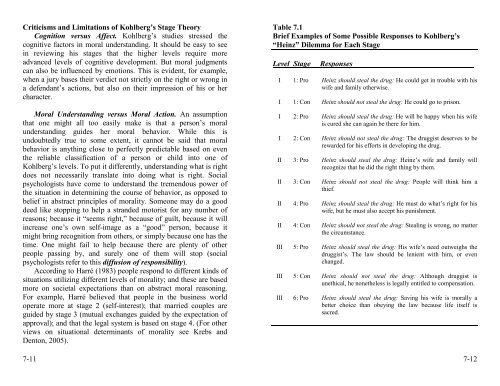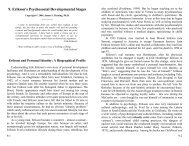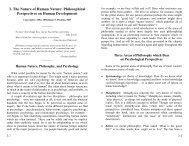7. Piaget, Kohlberg, Gilligan, and Others on Moral Development
7. Piaget, Kohlberg, Gilligan, and Others on Moral Development
7. Piaget, Kohlberg, Gilligan, and Others on Moral Development
You also want an ePaper? Increase the reach of your titles
YUMPU automatically turns print PDFs into web optimized ePapers that Google loves.
Criticisms <str<strong>on</strong>g>and</str<strong>on</strong>g> Limitati<strong>on</strong>s of <str<strong>on</strong>g>Kohlberg</str<strong>on</strong>g>’s Stage Theory<br />
Cogniti<strong>on</strong> versus Affect. <str<strong>on</strong>g>Kohlberg</str<strong>on</strong>g>’s studies stressed the<br />
cognitive factors in moral underst<str<strong>on</strong>g>and</str<strong>on</strong>g>ing. It should be easy to see<br />
in reviewing his stages that the higher levels require more<br />
advanced levels of cognitive development. But moral judgments<br />
can also be influenced by emoti<strong>on</strong>s. This is evident, for example,<br />
when a jury bases their verdict not strictly <strong>on</strong> the right or wr<strong>on</strong>g in<br />
a defendant’s acti<strong>on</strong>s, but also <strong>on</strong> their impressi<strong>on</strong> of his or her<br />
character.<br />
<strong>Moral</strong> Underst<str<strong>on</strong>g>and</str<strong>on</strong>g>ing versus <strong>Moral</strong> Acti<strong>on</strong>. An assumpti<strong>on</strong><br />
that <strong>on</strong>e might all too easily make is that a pers<strong>on</strong>’s moral<br />
underst<str<strong>on</strong>g>and</str<strong>on</strong>g>ing guides her moral behavior. While this is<br />
undoubtedly true to some extent, it cannot be said that moral<br />
behavior is anything close to perfectly predictable based <strong>on</strong> even<br />
the reliable classificati<strong>on</strong> of a pers<strong>on</strong> or child into <strong>on</strong>e of<br />
<str<strong>on</strong>g>Kohlberg</str<strong>on</strong>g>’s levels. To put it differently, underst<str<strong>on</strong>g>and</str<strong>on</strong>g>ing what is right<br />
does not necessarily translate into doing what is right. Social<br />
psychologists have come to underst<str<strong>on</strong>g>and</str<strong>on</strong>g> the tremendous power of<br />
the situati<strong>on</strong> in determining the course of behavior, as opposed to<br />
belief in abstract principles of morality. Some<strong>on</strong>e may do a good<br />
deed like stopping to help a str<str<strong>on</strong>g>and</str<strong>on</strong>g>ed motorist for any number of<br />
reas<strong>on</strong>s; because it “seems right,” because of guilt, because it will<br />
increase <strong>on</strong>e’s own self-image as a “good” pers<strong>on</strong>, because it<br />
might bring recogniti<strong>on</strong> from others, or simply because <strong>on</strong>e has the<br />
time. One might fail to help because there are plenty of other<br />
people passing by, <str<strong>on</strong>g>and</str<strong>on</strong>g> surely <strong>on</strong>e of them will stop (social<br />
psychologists refer to this diffusi<strong>on</strong> of resp<strong>on</strong>sibility).<br />
According to Harré (1983) people resp<strong>on</strong>d to different kinds of<br />
situati<strong>on</strong>s utilizing different levels of morality; <str<strong>on</strong>g>and</str<strong>on</strong>g> these are based<br />
more <strong>on</strong> societal expectati<strong>on</strong>s than <strong>on</strong> abstract moral reas<strong>on</strong>ing.<br />
For example, Harré believed that people in the business world<br />
operate more at stage 2 (self-interest); that married couples are<br />
guided by stage 3 (mutual exchanges guided by the expectati<strong>on</strong> of<br />
approval); <str<strong>on</strong>g>and</str<strong>on</strong>g> that the legal system is based <strong>on</strong> stage 4. (For other<br />
views <strong>on</strong> situati<strong>on</strong>al determinants of morality see Krebs <str<strong>on</strong>g>and</str<strong>on</strong>g><br />
Dent<strong>on</strong>, 2005).<br />
7-11<br />
Table <str<strong>on</strong>g>7.</str<strong>on</strong>g>1<br />
Brief Examples of Some Possible Resp<strong>on</strong>ses to <str<strong>on</strong>g>Kohlberg</str<strong>on</strong>g>’s<br />
“Heinz” Dilemma for Each Stage<br />
Level Stage Resp<strong>on</strong>ses________________________________<br />
I 1: Pro Heinz should steal the drug: He could get in trouble with his<br />
wife <str<strong>on</strong>g>and</str<strong>on</strong>g> family otherwise.<br />
I 1: C<strong>on</strong> Heinz should not steal the drug: He could go to pris<strong>on</strong>.<br />
I 2: Pro Heinz should steal the drug: He will be happy when his wife<br />
is cured she can again be there for him.<br />
I 2: C<strong>on</strong> Heinz should not steal the drug: The druggist deserves to be<br />
rewarded for his efforts in developing the drug.<br />
II 3: Pro Heinz should steal the drug: Heinz’s wife <str<strong>on</strong>g>and</str<strong>on</strong>g> family will<br />
recognize that he did the right thing by them.<br />
II 3: C<strong>on</strong> Heinz should not steal the drug: People will think him a<br />
thief.<br />
II 4: Pro Heinz should steal the drug: He must do what’s right for his<br />
wife, but he must also accept his punishment.<br />
II 4: C<strong>on</strong> Heinz should not steal the drug: Stealing is wr<strong>on</strong>g, no matter<br />
the circumstance.<br />
III 5: Pro Heinz should steal the drug: His wife’s need outweighs the<br />
druggist’s. The law should be lenient with him, or even<br />
changed.<br />
III 5: C<strong>on</strong> Heinz should not steal the drug: Although druggist is<br />
unethical, he n<strong>on</strong>etheless is legally entitled to compensati<strong>on</strong>.<br />
III 6: Pro Heinz should steal the drug: Saving his wife is morally a<br />
better choice than obeying the law because life itself is<br />
sacred.<br />
7-12




